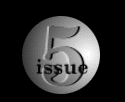




| ||
movie review by Gary Johnson [click on photos Official Web site for GATTACA |
In the world of Gattaca, you can choose the color of your child's eyes, the likelihood of obesity, the degree of intelligence, the tendency to violence, and many other characteristics. These choices are extremely important, for in the future, any slight defect -- or the potential for a defect -- may forever brand your child as imperfect. "We have enough imperfections built in already," says a doctor. The imperfect people clean toilets while the genetically perfect people work in pristine offices while designing interplanetary space flights.
Gattaca is the debut feature film of director Andrew Niccol, and it's an assured, stylish debut, a marvelously-designed and photographed vision of the future that brims with paranoia and pent-up desires. Filmed in cool blues and steely grays, Niccol captures a sterile and stifling view of the future: this isn't the future of Blade Runner or The Fifth Element. It's a future of cold surfaces, immaculately-maintained office buildings, and stark apartments. The world of Gattaca definitely isn't chaotic. To the contrary, it's a world strictly controlled and monitored every hour of the day.
Ethan Hawke stars as Vincent Freeman, a young man who dreams of the stars; however, only the people who are genetically perfect are considered for space missions. Vincent makes a living as part of a cleaning crew, but he isn't satisfied with his life. So he contacts a black market business man who deals in human lives. By changing his identity, Vincent can attempt to realize his quest for the stars. But maintaining that identity in Gattaca isn't easy. Random urine and blood tests routinely ferret out the impostors. They can identify you from your saliva residue on a sealed letter or from a single skin cell left behind when you touch a doorknob: the world of Gattaca has "discrimination down to a science." To protect his identify, Vincent must vacuum his workspace and leave behind hair and skin scrapings from the person he is impersonating (which he sprinkles from a small vial). He must wear a false bladder for the urine tests and false fingertips for the fingerprint analyzer.
Ironically, in a world where everyone believes in the infallibility of the machines to determine our identities, no one really pays close attention to faces. In fact, Vincent doesn't particularly look like the man he is impersonating, but no one seems to care. As long as the tests indicate that he's genetically perfect, his face isn't important. "They won't believe one of their elite could have fooled them."
Uma Thurman plays a co-worker of Vincent. Her initial doubts about Vincent lead her to investigate him, but the more she finds out the more intrigued she becomes. And Jude Law practically steals the film as the genetically perfect man -- now crippled after an accident -- who lends his identify to Vincent. Confined to a wheelchair, he lives off of Vincent's dreams and tries to help him succeed. Their relationship becomes surprisingly poignant.
In Gattaca, director Niccol has captured a world akin to George Orwell's 1984. It's a world of carefully monitored behavior, where few spontaneous actions take place. Everything is planned. Everything is measured. Mini-genetic labs operate on the streets. For just a few dollars, the lab clerks will test a strand of hair or the saliva left on a lover's lips. Niccol enforces the rigidity of Gattaca by giving us cold colors and smooth surfaces. The office where Vincent works is a masterpiece of design with its high ceiling and deep blue shadows. The art design creates a museum-like atmosphere devoid of human warmth. (Production designer Jan Roelfs also designed the magnificent sets for Peter Greenaway's The Cook, The Thief, His Wife and Her Lover and Prospero's Books.) At the same time, cinematographer Slawomir Idziak creates stunningly beautiful images that plaintively evoke an atmosphere of repressed desire.
Gattaca is a remarkable accomplishment for first-time director Niccol, a work of astonishing control and beauty. Based upon his own original screenplay, Gattaca doesn't contain any laser guns or extraterrestrial creatures. He gives us one of the quietest science-fiction movies ever made.
I only wish the movie had pulled us deeper inside of Vincent's obsession with space travel. The filmmakers are less concerned with allowing us to experience Vincent's inner life than they are with capturing images on film. We find out in detail about Vincent's insecurities -- based on his experiences growing up: his brother was genetically-engineered and given a privileged path in life while Vincent was conceived naturally and branded as imperfect. We find out that Vincent refuses to accept his place in life, and he wants to prove that he can do whatever he wants. But we don't find out specifically what space travel means to him and why this has become his mania. As a result, Vincent's quest becomes somewhat hollow at the core. But the images are absolutely incredible and the relationship between Ethan Hawke and Jude Law is marvelously realized. Gattaca is the work of a tremendously gifted director and we should closely pay attention to the future career of Andrew Niccol.
| |





